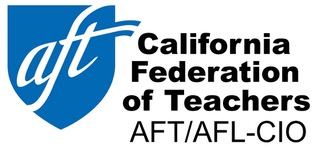August 7, 2017
Contact: Fred Glass, 510-579-3343, fglass@cft.org
CFT reaches settlement with accrediting agency
“Fair accreditation practices will be the norm going forward”
San Francisco—In an important step toward fairer accreditation practices in California’s community colleges, the California Federation of Teachers (CFT) has reached agreement with the Accrediting Commission for Community and Junior Colleges (ACCJC) to settle its long-standing lawsuit against the agency.
The agreement, which lays out a number of important accreditation policy changes—some of which have already occurred—states that, “These changes have institutionalized many of the remedies which were initially sought by the plaintiffs at the time of the filing of this case.”
Originally filed in September 2013, following the ACCJC’s reckless decision to terminate the accreditation of City College of San Francisco, the CFT’s lawsuit sought an injunction to keep the college open, and to force the agency to stop violating its own rules and the rule of law. That injunction was granted through a separate lawsuit filed by San Francisco City Attorney Dennis Herrera in San Francisco Superior Court, and in that lawsuit ACCJC was found to have broken several laws in its decision to terminate CCSF’s accreditation.
The CFT’s lawsuit addressed broader concerns than Herrera’s, seeking to end years of punitive, arbitrary, inconsistent and expensive actions by the Commission. The behavior brought to light by the CFT led many observers to decry the Commission’s lack of transparency and “culture of fear,” culminating in sharp criticism by the Chancellor’s office, the Board of Governors, the State Auditor, elected leaders in San Francisco, Sacramento, and Washington D.C., and sanctions by the U.S. Department of Education.
Last year, however, a number of changes in Commission leadership—including placing its controversial president, Barbara Beno, on administrative leave—ultimately led to fruitful discussions between CFT and the ACCJC. The Settlement Agreement includes the following changes:
- Not to interfere with community colleges’ collective bargaining process;
- the commission’s executive committee would recommend deleting accreditation standard III.A.6, requiring student learning outcomes (SLOs) to be used as a component of faculty evaluation;
- to adopt a policy to ensure at least three active duty faculty members are assigned to each college evaluation team;
- to adopt a policy establishing clear criteria by which the ACCJC may extend for “good cause” the two year period for a college to comply with accreditation standards as to which it has been found deficient;
- in determining a college’s financial stability, to apply its indicators consistently from college to college, and refrain from directing colleges what specific steps must be taken to achieve that stability;
- to reaffirm accreditation for 7 years with a follow up report for colleges with minor compliance issues, instead of the recently-adopted eighteen month period of reaffirmation; and
- to strengthen conflict of interest safeguards for commissioners and evaluation team members.
The settlement also establishes a dispute resolution procedure that begins outside of court in the event that CFT believes the ACCJC is not living up to its commitments.
CFT president Joshua Pechthalt said, “This agreement represents a sea change in the ACCJC’s operations in a number of significant ways. We believe that as a result of this settlement, fair accreditation practices will be the norm going forward.”
Jim Mahler, president of the CFT’s statewide Community College Council, said, “In fast-tracking these reforms, the ACCJC’s leadership has indicated the seriousness with which they view the settlement and their intent to implement it. We look forward to strengthening and improving the educational opportunities for the community college system’s two million students, no longer distracted by the accreditation problems of the past.”
CCSF faculty union president Tim Killikelly said, “On the heels of ACCJC finally granting City College of San Francisco full accreditation, and putting Compton College on a firm path to reaccreditation, this settlement is a vindication of our union’s decision to fight back against the illegal and unfair actions to which we had been subjected, and for the literal future of the college. This struggle took a big toll. What the agreement should mean is no one else will ever again have to go through what we at City College went through.”
“The campaign for fair accreditation in California led by the CFT has been incredibly successful. We hope this agreement signals a new direction for the accreditation process and the California community college system. Nonetheless, we will remain vigilant in holding ACCJC accountable. We believe this agreement and our vigilance together will help ensure a robust and fair accreditation system for California.”
####
The California Federation of Teachers represents more than 25,000 faculty in California’s community college system, and 120,000 employees at all levels of education in the state. For more information, cft.org.

